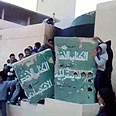
Rights group: 84 dead in Libyan protests
Forces storm protest camp in Benghazi, attack hundreds of people calling for Gadhafi's removal
Libyan special forces stormed a two-day-old protest encampment in the country's second largest city, clearing the area early Saturday, said witnesses, as a human rights group estimated 84 people have died in the harsh crackdown on days of demonstrations.
Internet was also cut around 2 am removing one of the few ways of Libyans can get out information about the waves of anti-government protests in one of the most isolated and repressive nations in North Africa.
At 5 am on Saturday, special forces attacked hundreds of protesters, including lawyers and judges, camped out in front of the courthouse in the eastern city of Benghazi, which has been a focus for the anti-government unrest.
"They fired tear gas on protesters in tents and cleared the areas after many fled carrying the dead and the injured," one protester said over the phone from Benghazi. "This is a ghost city; we are all afraid that something big is going to happen in Benghazi today."
The protester declined to be identified, echoing the fear of reprisal widespread among the people.
Thousands of protesters are calling for the removal Moammar Gadhafi, Libya's leader for the past 42 years, mainly in the cities of the country's impoverished east. Their demonstrations have been brutally suppressed with a combination of armed militias and elite forces.
The New York-based Human Rights Watch estimated 84 people have been killed across the east over the last three days, based on reports from hospitals and witnesses. Tolls given to the Associated Press Friday largely tally with those announced by the rights group.
"The Libyan authorities should immediately end attacks on peaceful protesters and protect them from assault by pro-government armed groups," the organization said in its statement.
'We were preparing for celebration'
Residents in Benghazi, which has borne the brunt of the casualties, said just hours before the attack on the encampment, the mood was ebullient as protesters torched police stations, government buildings and took over the local radio station.
They had set up tents on the street in front of the city's courthouse, overlooking the sea.
"We were preparing for a day of celebrations but now we don't know what the day will look like," the protester said.
Doctors in Benghazi said Friday that 35 bodies had been admitted to the hospital following attacks by security forces backed by militias, on top of more than a dozen killed the day before.
At least five cities of eastern Libya have seen protests and clashes in recent days. In one of them, Beyida, a hospital official said Friday that the bodies of at least 23 protesters slain over the past 48 hours were at his facility, which was treating about 500 wounded, some in the parking lot for lack of beds.
Forces from the military's elite Khamis Brigade moved into Benghazi, Beyida and several other cities, residents said. They were accompanied by militias that seemed to include foreign mercenaries, they added. Several witnesses reported French-speaking fighters, believed to be Tunisians or sub-Saharan Africans, among militiamen wearing blue uniforms and yellow helmets.
The Khamis Brigade is led by Gadhafi's youngest son Khamis Gadhafi, and US diplomats in leaked memos have called it "the most well-trained and well-equipped force in the Libyan military." The witnesses' reports that it had been deployed could not be independently confirmed.
Internet cut off
Internet was also cut off in Libya in the early hours of the morning Saturday, reported the US-based Arbor Networks security company, which detected a total cessation of online traffic in the North African country just after 2 am local time according to data from 30 Internet providers.
In effort to combat its own anti-government protests in January, the Egyptian government also cut off the Internet for several days, though it did not quell the uprising that eventually brought down the president.
Libya is oil-rich, but the gap between its haves and have-nots is wide, and the protests have flared hardest in the eastern parts of the country, the site of anti-government agitation in the past.
The Central Intelligence Agency estimates about one-third of Libyans live in poverty, and US diplomats have said in newly leaked memos that Gadhafi's regime seems to neglect the east intentionally, letting unemployment and poverty rise to weaken opponents there.
Information is tightly controlled in Libya, where journalists cannot work freely and many citizens fear the powerful security and intelligence services.
The government made an apparent gesture aimed at easing protests. The news website Quryna, which has ties to Seif al-Islam Gadhafi, another of the leader's sons, said Friday that the country's national congress has halted its session indefinitely and said many state executives will be replaced when it returns.
In addition to replacing top officials, it will endorse reforms to decentralize and restructure the government, it said.
There have been few anti-government protests in the capital Tripoli, in the west of the country, and instead the government has staged large pro-Gadhafi rallies.
- Follow Ynetnews on Facebook










